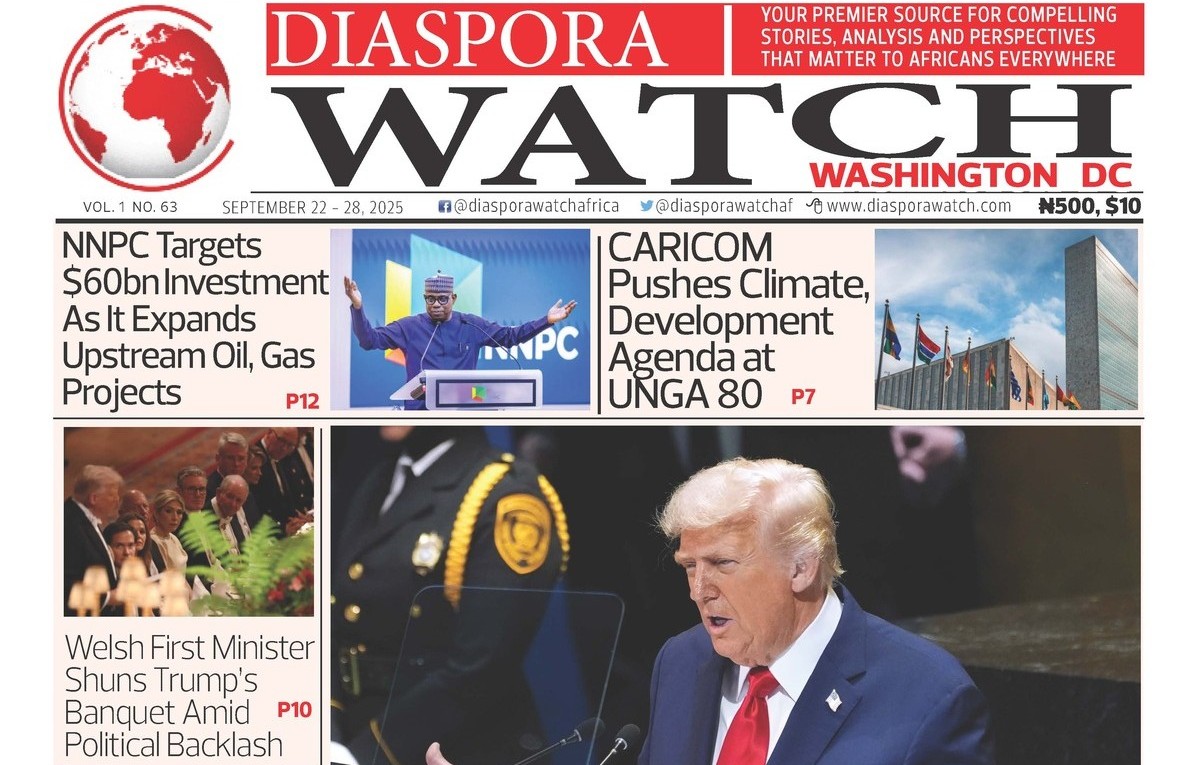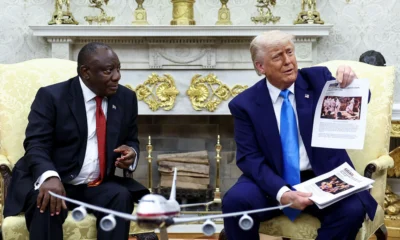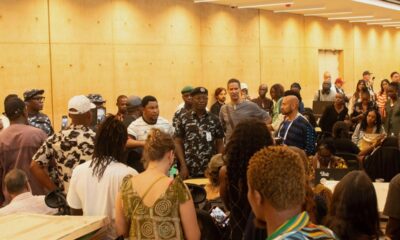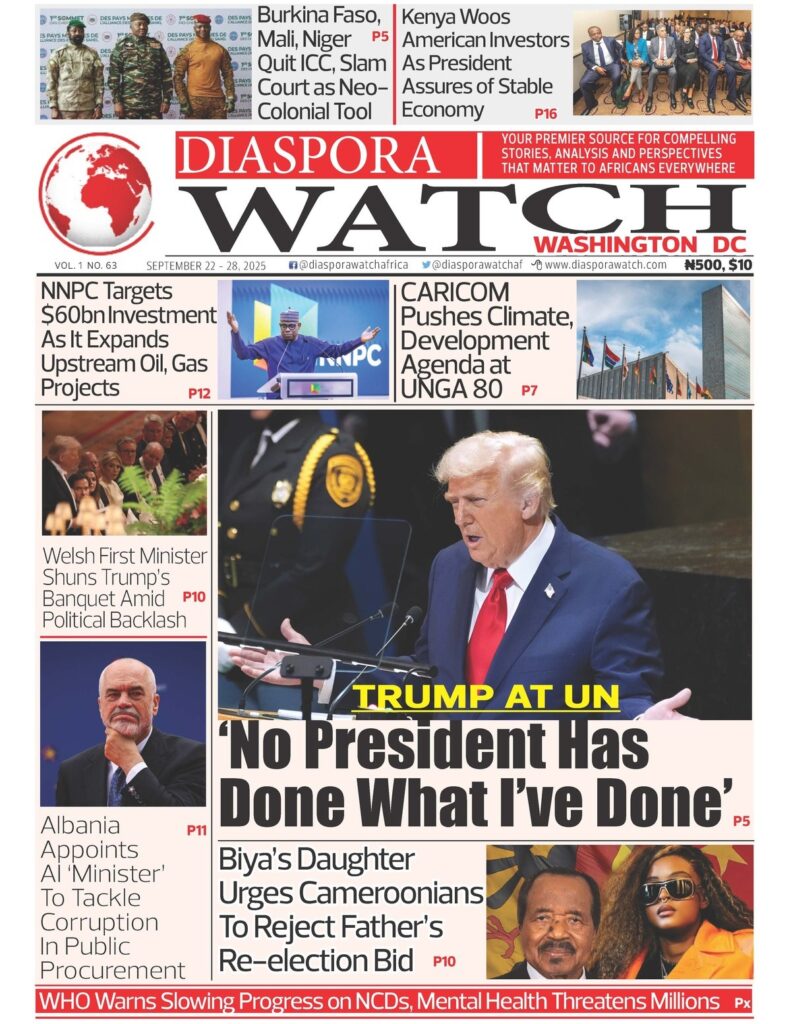Diaspora
Why G20, BRICS+ Shun Nigeria – Ex-Envoys

Some former envoys have said that the G20 and BRICS+ have continued to ignore Nigeria because of the country’s increasingly weak economy. Poor political leadership over the years has dwarfed Nigeria’s development, hence the country has not been able to meet the socio-economic standards of the G20, a premier global bloc for discussing economic issues; and the BRICS+, a nine-member economic and political force.
An import-dependent economy coupled with market instability and the unpredictable forex exchange regime cannot attract investors or economic allies ¹ ². These were the thoughts of Nigeria’s former Deputy Permanent Representative to the United Nations, Usman Sarki; Nigeria’s former Ambassador to the Benin Republic, Lawrence Obisakin; and ex-Senior Advisor to the United Nations (Nigeria Office),
Fred Eno. South Africa, with about 62.4 million population, and a Gross Domestic Product of $373.23bn, according to data by the International Monetary Fund (IMF), is a member of BRICS+ and the G20, while Nigeria with 227 million people and $252.74bn GDP is not a member of both blocs. Sarki said the membership of the two global groups is not automatic and that Nigeria has not met the economic standards to join the blocs.
He said Nigerian leaders must have the discipline to organize and stabilize the economy to attract investors and create jobs as these would send the right signals to the international community. Obisakin agreed with Sarki saying that no global bloc would want to work together with a country when there are no common interests. Obisakin, a former Nigerian Ambassador to the Benin Republic, said becoming a member of the G20 and BRICS+ goes beyond having a large population and vast geographical spread. He said when a nation is strong economically, people would want to identify with it.
When you talk about the strength of a nation, it’s not just demography, population could be a disaster if not a liability, we are talking of the Nigerian population being well trained and equipped. A country that is unable to feed itself is unstable, he added.
He noted political stability and security as another factor considered by developmental partners. Citing the recent suicide bombings in the Gwoza area of Borno State, the ex-envoy said, A country that is insecure cannot attract investments because if it can happen in the country, it can happen anywhere in the country.
Similarly, Eno, a former UN advisor, shared the views of Sarki and Obisaki, saying that with Nigeria’s intimidating population and the size of its economy, being a member of the G20 and the BRICS+ should have been automatic but for institutional challenges.
One would have assumed that it is something natural given the size of the population and the economy. For G20, part of it has to do with our own institutions and how they function, he said. Eno said Nigeria’s institutions are
not manned by the right people to provide the right kind of information that our decision-makers can rely on to make the right policies.
The three ex-envoys urged the Federal Government to set enduring solutions to the challenges of forex exchange volatility, skyrocketing interest rates, soaring inflation, food crisis, and many more encumbrances highlighted by manufacturers and industrialists because the internal dynamics of the country are what shape the image of the country externally
Diaspora
Diaspora Watch Vol. 63

Diaspora Watch Unveils 63rd Edition: A Global Mirror of Power, Politics and People
Diaspora Watch Vol. 63 FREE Digital View: https://diasporawatch.com/3d-flip-book/diaspora-watch-vol-63/
On Demand Print: https://www.magcloud.com/browse/issue/3172875?__r=1069759
Subscribe to Diaspora Watch Now on the link below!!!
https://diasporawatch.com/subscribe-to-diaspora-watch-newspaper/
The 63rd edition of Diaspora Watch Newspapers has hit the stands this week, bringing readers a compelling mix of global power plays, continental shifts, economic pursuits and cultural flashpoints.
From New York to Niamey, London to Lagos, the edition offers a panoramic view of unfolding events shaping the world and Africa’s place within it.
On the cover, U.S. politics takes centre stage as President Donald Trump, addressing the United Nations, boldly declares: “No President Has Done What I’ve Done.” In a dramatic twist on African geopolitics, Burkina Faso, Mali and Niger jointly announce their withdrawal from the International Criminal Court, condemning it as a “neo-colonial tool.”
Kenya’s President turns to America’s corporate giants, assuring investors of stability in a pitch to attract capital inflows. Nigeria equally seizes the moment, with the NNPC outlining ambitious upstream oil and gas expansion plans targeting $60 billion in investment. Across the Caribbean, CARICOM leaders rally at the UNGA 80, pressing hard for climate justice and a development agenda that cannot be ignored.
Europe is not left out of the storm: the Welsh First Minister pointedly shuns Trump’s banquet, fueling political ripples back home, while in Africa, Cameroon’s political dynasty faces unusual pressure as President Biya’s daughter openly calls on citizens to reject her father’s re-election bid. Elsewhere, Albania breaks new ground with the appointment of an AI “Minister” to combat corruption in public procurement — a move being hailed as futuristic governance.
On the health front, the World Health Organization issues a sobering warning, noting that slowing progress on non-communicable diseases and mental health is putting millions at risk globally.
Sports enthusiasts will find gripping drama on the back page, where Manchester United’s crisis-hit boss lays down the gauntlet with a blunt declaration: “My way or no way.”
Diaspora
Diaspora Watch Vol. 62

Diaspora Watch 62nd Edition Is Here!
Diaspora Watch FREE Digital View: https://diasporawatch.com/3d-flip-book/diaspora-watch-vol-62/
On Demand Print: https://www.magcloud.com/browse/issue/3172869?__r=1069759
Subscribe to Diaspora Watch Now on the link below!!!
https://diasporawatch.com/subscribe-to-diaspora-watch-newspaper/
The 62nd edition of Diaspora Watch Newspapers is out, delivering a hard-hitting blend of global politics, African affairs, diplomacy, business, health, and culture, with stories that cut across continents and shape conversations.
Leading the cover is a riveting headline from London, where Donald Trump’s UK visit takes a dramatic turn as he sidesteps the brewing Mandelson–Epstein controversy, raising eyebrows in diplomatic and media circles alike.
In the Middle East, Saudi authorities have freed three Nigerian pilgrims detained over alleged drug trafficking, bringing relief to families back home. On the domestic front, Labour Party’s Peter Obi lambasts President Tinubu over plans for emergency rule in Rivers State, stoking fresh political debates.
The global economy also takes centre stage: the United Kingdom secures a massive £150 billion U.S. investment as Prime Minister Keir Starmer and Donald Trump strike a landmark tech deal. Meanwhile, South Sudan is plunged deeper into crisis as President Salva Kiir suspends his deputy, Riek Machar, and accuses him of treason.
In Asia, U.S.-China tensions flare once again as Beijing slams Nvidia with monopoly breach accusations, just as both nations resume sensitive trade talks. Public health makes headlines with the World Health Organization’s grim report of a 50% surge in global cholera deaths. From Europe, Spain introduces disaster preparedness lessons for children, a move hailed as a pioneering approach to climate resilience.
The Caribbean bloc, CARICOM, issues a firm condemnation of Israel’s strike on Qatar, insisting on respect for international law. In the energy sector, the United States oil industry struggles as job losses mount and companies slash spending amid sliding prices.
On the cultural front, Hollywood dazzles as Brad Pitt and The Studio emerge dominant at the 2025 Emmy Awards, sealing their place in entertainment history.
With fearless reportage and bold editorial framing, Diaspora Watch continues to provide the diaspora community with sharp insights and global perspectives, reinforcing its position as the voice of Africans abroad and a trusted lens on world affairs.
The 62nd edition is available now in print and digital formats.
Diaspora
Diaspora Watch Vol. 56

Global Economic Shifts Dominate Diaspora Watch’s 56th Edition
The 56th edition of Diaspora Watch is out, and it’s packed with insightful analysis on the latest global economic trends.
Diaspora Watch FREE Digital View: https://diasporawatch.com/3d-flip-book/diaspora-watch-vol-56/
SUBSCRIBE TO DIASPORA WATCH NOW ON THE BELOW LINK !!!
https://diasporawatch.com/subscribe-to-diaspora-watch-newspaper/
This issue shines a spotlight on the US sanctions targeting firms across Asia and the Middle East over their links to Iran’s oil industry, sparking a ripple effect in the global energy market.
Meanwhile, Africa is making a strategic pivot towards China, capitalizing on the Asian giant’s economic prowess amidst US tariffs. This shift is poised to redefine Africa’s economic landscape and open up new opportunities for growth and development.
In other news, the 2025 ACTIF conference brought together key stakeholders, including Amb. Tochil Nwaneri, as the Africa and Caribbean regions signed $290 million worth of deals. This landmark agreement is set to bolster economic ties between the two regions and drive progress.
Japanese investors are also taking notice of Africa’s growth story, eyeing opportunities to tap into the continent’s vast potential.
However, the US fertility rate has plummeted to 1.6 kids per woman, raising concerns about the country’s demographic future.
On the faith front, Bishop Ogunedo urged the faithful to maintain firm faith in the Lord Jesus, emphasizing the importance of spiritual resilience in these uncertain times.
This edition of Diaspora Watch also highlights the NNPC’s assurance of speedy delivery of the $2.8 billion AKK gas pipeline project, Guyana’s new official residence for the CARICOM Secretary-General, and Tinubu’s conferment of national honors on the Super Falcons.
Stay informed with Diaspora Watch’s 56th edition, your premier source for global news and analysis.
Stay connected with the world around you – read Diaspora Watch today!
Celebrating African excellence and spotlighting pressing global issues.
#DiasporaWatch #AfricaInFocus #GlobalNews #CulturalVoices #AfricanPerspective
-

 Politics3 days ago
Politics3 days agoTrump Snubs G20 Summit over ‘White Genocide’ Claims in South Africa
-

 Analysis3 days ago
Analysis3 days agoTrump’s Blacklist and the Burden of Nigeria’s Image, by Boniface Ihiasota
-

 News3 days ago
News3 days agoProtesters Disrupt Preview of Multi-Million Dollar Museum in Benin City
-

 News3 days ago
News3 days agoCARICOM to Host Webinar on E-Waste Management in Renewable Energy Systems
-

 News3 days ago
News3 days agoTrump Blasts ‘Corrupt Journalists’ After BBC Chief Resigns Over Documentary Scandal
-

 Extra3 days ago
Extra3 days agoAyomide Kashim Ibrahim: Redefining Global Finance Through Inclusion and Innovation











